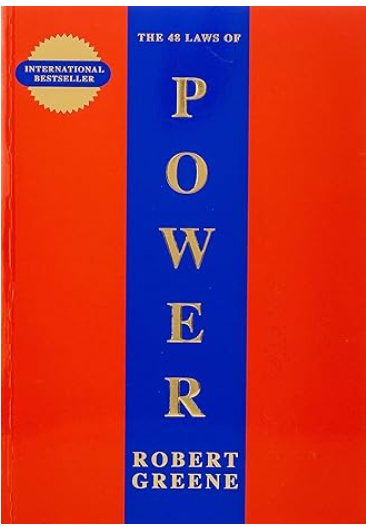"The 48 Laws of Power" by Robert Greene is a highly influential and controversial book that explores the principles and strategies of power dynamics in human relationships. Published in 1998, it has gained notoriety for its ruthless and often Machiavellian advice. Here's a detailed review of the book:
**Title:** The 48 Laws of Power
**Author:** Robert Greene
**Publication Year:** 1998
Review:
**1. Comprehensive Exploration of Power:** Robert Greene's book is a comprehensive examination of the dynamics of power, drawing from historical anecdotes, classical philosophy, and real-life examples. It dissects the strategies and tactics used by powerful individuals throughout history to acquire and maintain power.
**2. Historical and Literary References:** The book is filled with references to historical figures, political leaders, philosophers, and writers who have wielded power effectively. These references provide readers with a rich tapestry of examples and lessons from various time periods and cultures.
**3. Thought-Provoking and Controversial:** "The 48 Laws of Power" is a thought-provoking and controversial work. Some readers may find the advice and strategies it offers to be morally ambiguous or even unethical. It challenges conventional notions of morality and ethics, which can make it a polarizing read.
**4. Practical Application:** Each of the 48 laws is presented with explanations and practical applications. Greene offers examples of how these laws can be employed in various situations, both in personal and professional contexts. Readers can choose to apply these laws or simply use them as a means of understanding power dynamics.
**5. Dark Side of Human Nature:** The book delves into the darker aspects of human nature and behavior, including manipulation, deception, and strategic thinking. It explores the idea that power often involves a degree of ruthlessness and cunning.
**6. Awareness and Defense:** Some readers may find the book valuable as a means of understanding and defending against manipulative or power-hungry individuals. By becoming aware of these tactics, individuals can protect themselves from being manipulated.
**7. Critique:** Critics argue that the book promotes unethical behavior and a cynical worldview. They contend that the focus on power at any cost can lead to destructive consequences and undermine trust in relationships.
**8. Interpretation:** The book's laws can be open to interpretation, and not all readers will agree with every piece of advice. Some laws are more universally applicable than others, and the appropriateness of their application may depend on specific circumstances.
**9. Historical Anecdotes:** The historical anecdotes and examples provide rich context, but they may also be seen as somewhat disconnected from contemporary life. Readers may need to bridge the gap between historical events and modern situations.
**10. Influence on Popular Culture:** "The 48 Laws of Power" has had a significant influence on popular culture, from business and politics to entertainment. It has been referenced in movies, television shows, and even in discussions of real-world power dynamics.
In summary, "The 48 Laws of Power" by Robert Greene is a provocative and polarizing book that explores the strategies and tactics of acquiring and wielding power. It draws from historical and literary sources to present a comprehensive examination of power dynamics. While some readers may find its content controversial or morally challenging, it remains a widely discussed and influential work that has left a lasting impact on discussions of power and strategy in various fields. Readers should approach the book with critical thinking and ethical considerations, as it presents a view of power that may not align with everyone's values and beliefs.

No comments:
Post a Comment